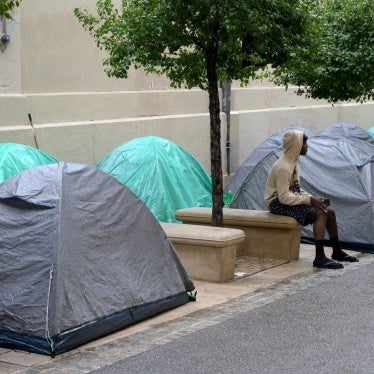(Paris, June 24, 2015) -- The Paris Court of Appeals on June 24, 2015 ordered the French government to pay damages to people subjected to unwarranted identity checks, a turning point in the fight to end ethnic profiling in France, seven French and international human rights organizations said.
In five landmark decisions, the court ruled that discriminatory ID checks are illegal and that "It is, moreover, of little consequence that no humiliating or insulting statements were made during these checks.” The Court of Appeals found rights violations in 5 of the 13 cases it reviewed. All 13 cases had been dismissed in lower court.
"The judges have reminded the government that the principles of equality and non-discrimination also apply to the police," said Slim Ben Achour, who represented the 13 people filing suit, along with Felix de Belloy.
The court pointedly emphasized that it is the government’s obligation to employ all means necessary to prevent discrimination, and that it had failed in its duty. The court noted in particular that the absence of any record for identity checks means victims are deprived of effective legal recourse in cases of discrimination or abuse.
The court also stressed that it is the judge’s role to ensure there are objective grounds for checks.
Despite this victory in five cases, the eight negative decisions raise troubling concerns. The court found no violations when checks occurred in neighborhoods said to be dangerous, even if the police had no objective grounds for stopping the individuals. The court explicitly pointed out that the plaintiffs’ behavior would not have been considered suspicious elsewhere, but can be considered so in locations viewed as "dangerous".
By making a distinction between identical situations occurring in different neighborhoods, the court created a two-tiered justice system, one for the low-income suburban sections seen as "sensitive areas" and one for other sections. The ruling also placed an undue burden on the individuals stopped, who must produce evidence of discriminatory intent. It failed to fully apply the standards of non-discrimination otherwise recognized by the court in these decisions.
The Court of Appeals’ decision should move the government to reform its legal framework for identity checks so that they may only be conducted based on objective, individual grounds, and to provide individuals a record of an identity check stating why they were stopped. These measures should be part of a more thoroughgoing reform of identity checks to put an end to ethnic profiling, a commitment made by president Francois Hollande before his election in 2012.
"These decisions will undoubtedly induce government authorities at the highest levels to take steps to guarantee citizens’ fundamental rights, especially as they become a basis for future jurisprudence," said Lanna Hollo, spokesperson for the Open Society Justice Initiative in France.
----------------------------
Signatories:
Human Rights Watch, Ligue des Droits de l’Homme, Open Society Justice Initiative, Syndicat des avocats de France, Syndicat de la Magistrature Gisti, Maison pour un développement solidaire






